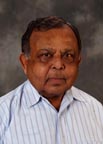February 01, 2007
American Physical Society honors Malik
CARBONDALE, Ill. — A physics researcher at Southern Illinois University Carbondale is one of a handful of scientists honored by a leading group of scholars.F. Bary Malik, professor emeritus in the Department of Physics in the College of Science at SIUC, is the recipient of this year's John Wheatley Award from the American Physical Society. Malik will receive $2,000 and a certificate and will speak at the society's annual meeting March 6 in Denver.
The award, which is presented every other year, honors physicists who make contributions to the development of the field in the third-world countries by working with researchers and teachers there.
The society will honor Malik for his extensive contributions to developing physics and inspiring physicists in emerging nations and collaborating, organizing and attracting resources for more than 30 years. Malik has worked with physicists from countries including Argentina, Bangladesh, India, Pakistan, Jordan and many others. He has organized countless conferences and collaborated on and facilitated dozens of research projects.
Malik retired in 2005 after 25 years at the University. He was named SIUC's Outstanding Scholar in 1996, and continues to conduct research at the University. His work includes heavy-ion physics, strange particle production from hot nuclei and fission theory, among other topics.
Aldo Migone, chair of the physics department, said the honor is well deserved.
"We were very happy to hear this news because he certainly has done his fair share in promoting physics in these other countries," Migone said. "It's absolutely true that physics is very much an international enterprise and anything that helps bring together the people who are doing research in different countries is a positive thing."
During the society's meeting in March, Malik will give a lecture titled "Maximum entropy-principle approach to quantum storage in strongly correlated systems," which discusses new possibilities for storing information in futuristic quantum computers. 
